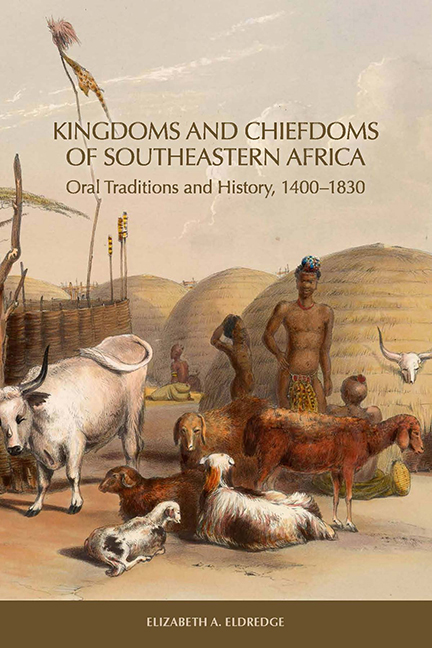Book contents
- Frontmatter
- Contents
- List of Illustrations
- Preface
- 1 History and Oral Traditions in Southeastern Africa
- 2 Oral Traditions in the Reconstruction of Southern African History
- 3 Shipwreck Survivor Accounts from the Sixteenth and Seventeenth Centuries
- 4 Founding Families and Chiefdoms East of the Drakensberg
- 5 Maputo Bay Peoples and Chiefdoms before 1740
- 6 Maputo Bay, 1740–1820
- 7 Eastern Chiefdoms of Southern Africa, 1740–1815
- 8 Zulu Conquests and the Consolidation of Power, 1815–21
- 9 Military Campaigns, Migrations, and Political Reconfiguration
- 10 Ancestors, Descent Lines, and Chiefdoms West of the Drakensberg before 1820
- 11 The Caledon River Valley and the BaSotho of Moshoeshoe, 1821–33
- 12 The Expansion of the European Presence at Maputo Bay, 1821–33
- 13 Southern African Kingdoms on the Eve of Colonization
- Appendix A Ama Swazi King Lists
- Appendix B Chronology of Conflicts, Migrations, and Political Reconfiguration East of the Drakensberg in the Era of Shaka
- Appendix C Interviewees from the James Stuart Collection of Oral Traditions
- Notes
- Bibliography
- Index
Appendix C - Interviewees from the James Stuart Collection of Oral Traditions
Published online by Cambridge University Press: 14 March 2018
- Frontmatter
- Contents
- List of Illustrations
- Preface
- 1 History and Oral Traditions in Southeastern Africa
- 2 Oral Traditions in the Reconstruction of Southern African History
- 3 Shipwreck Survivor Accounts from the Sixteenth and Seventeenth Centuries
- 4 Founding Families and Chiefdoms East of the Drakensberg
- 5 Maputo Bay Peoples and Chiefdoms before 1740
- 6 Maputo Bay, 1740–1820
- 7 Eastern Chiefdoms of Southern Africa, 1740–1815
- 8 Zulu Conquests and the Consolidation of Power, 1815–21
- 9 Military Campaigns, Migrations, and Political Reconfiguration
- 10 Ancestors, Descent Lines, and Chiefdoms West of the Drakensberg before 1820
- 11 The Caledon River Valley and the BaSotho of Moshoeshoe, 1821–33
- 12 The Expansion of the European Presence at Maputo Bay, 1821–33
- 13 Southern African Kingdoms on the Eve of Colonization
- Appendix A Ama Swazi King Lists
- Appendix B Chronology of Conflicts, Migrations, and Political Reconfiguration East of the Drakensberg in the Era of Shaka
- Appendix C Interviewees from the James Stuart Collection of Oral Traditions
- Notes
- Bibliography
- Index
Summary
Volume and page numbers refer to C. de B. Webb and J. B. Wright, eds., The James Stuart Archive of Recorded Oral Evidence Relating to the History of the Zulu and Neighbouring Peoples, Killie Campbell Africana Library Manuscript Series, vols. 1–5 (Durban: Killie Campbell African Library; Pietermaritzburg: University of Natal Press, 1976–2001). The interview notes of James Stuart, both published by Webb and Wright and unpublished, are the source for the information compiled in this appendix. This list includes only those interviewees of James Stuart who are cited in this book.
Baleka ka Mpitikazi, JSA, 1:4–14. Interviewed in 1919. She was born about 1856. Her paternal ancestry was of the royal family of the AbaQwabe chiefdom, and her father was directly descended from Qwabe ka Malandela, the brother of Zulu ka Malandela. Her grandmother was a first cousin of Nandi, Shaka's mother.
Baleni ka Silwana, JSA, 1:16–52. Interviewed in 1914. He was born about 1838. His paternal ancestry was the AmaMpungose chiefLy line of descent.
Dinya ka Zokozwayo, JSA, 1:95–123. Interviewed February, March, and April 1905. He was born about 1827 and was from the AbaQwabe who had submitted to the rule of the AmaCele chiefdom under Magaye south of the Thukela River. At the time of the interview Dinya was from the Ifafa mission station.
His paternal ancestry was of the royal family of the AbaQwabe chiefdom and his father was directly descended from Qwabe ka Malandela, the brother of Zulu ka Malandela.
John Gama, JSA, 1:132–46. Interviewed in 1898. He was born about 1841– 42. His father had left Swaziland for KwaZulu-Natal in about 1843–44, and John Gama had returned there in about 1873. J. S. M. Matsebula, author of History of Swaziland, used original notes written by John Gama.
Giba ka Sobuza, JSA, 1:149–54. Interviewed in 1898. Son of Ama Swazi king Sobhuza.
Jantshi ka Nongila, JSA, 1:174–207. Interviewed in 1903. He was born at Nyezane in about 1848. His paternal ancestry belonged to the Mabaso chiefdom.
Kambi ka Matshobana, JSA, 1:208–12. Interviewed in 1903. He was born about 1864. His paternal family was from the AbaQwabe chiefdom.
- Type
- Chapter
- Information
- Kingdoms and Chiefdoms of Southeastern AfricaOral Traditions and History, 1400–1830, pp. 339 - 346Publisher: Boydell & BrewerPrint publication year: 2015

